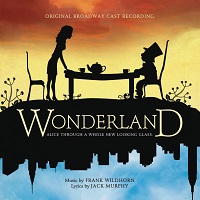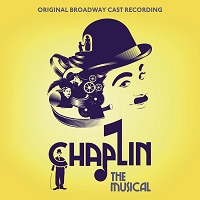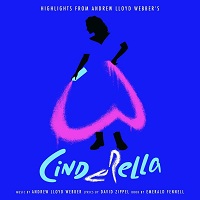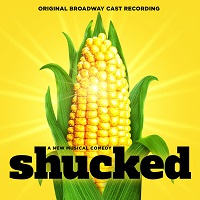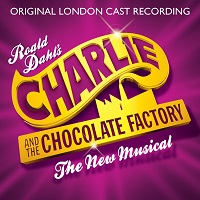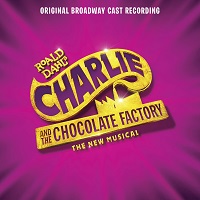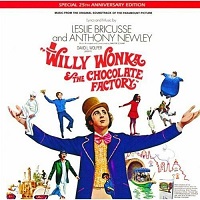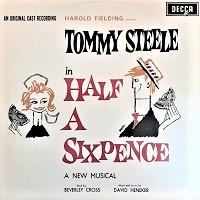 Original London Cast, 1963 (Decca/Must Close Saturday)
Original London Cast, 1963 (Decca/Must Close Saturday)  (3 / 5) There’s no question that Half A Sixpence, the musical adaptation of the H. G. Wells novel Kipps, was all about spotlighting Tommy Steele, the British singer, guitarist, and banjo boy who won teenage hearts in the late 1950s before turning to theater. Steele brings gregarious energy to the role of Arthur Kipps, a hard-working orphan who inherits a surprise fortune that leads him astray. (You can almost hear his grin through your speakers.) But although he may be the scene-Steeler here, the real star is David Heneker’s utterly lovely, music hall-inspired score, buoyed by the sweeping orchestrations of Arthur Wilkinson and Peter Knight and well conducted by Kenneth Alwyn. Marti Webb plays Arthur’s down-to-earth childhood sweetheart Ann with Cockney brassiness; the role would diminish a bit in subsequent productions, but Webb makes a meal of the substantial material she’s given here. Anna Barry as Ann’s rival, Helen, has a quirky operatic song, “The Oak and the Ash,” which would be gone by the time the show reached Broadway. And though this original London cast album doesn’t give us the most electric of Steele’s recorded performances in the role, it preserves a number of songs that aren’t available anywhere else in their original form, such as the Blue Danubey waltz “The Old Military Canal,” the gently bouncing duet “The One That’s Run Away” (which would be repurposed for the 2016 revisal), and a lengthy, two-part counterpoint number, “I’ll Build A Palace”/”I Only Want A Little House,” that seems like a British precursor to “An Old-Fashioned Wedding,” written by Irving Berlin for the 1966 Lincoln Center revival of Annie Get Your Gun. — Dan Rubins
(3 / 5) There’s no question that Half A Sixpence, the musical adaptation of the H. G. Wells novel Kipps, was all about spotlighting Tommy Steele, the British singer, guitarist, and banjo boy who won teenage hearts in the late 1950s before turning to theater. Steele brings gregarious energy to the role of Arthur Kipps, a hard-working orphan who inherits a surprise fortune that leads him astray. (You can almost hear his grin through your speakers.) But although he may be the scene-Steeler here, the real star is David Heneker’s utterly lovely, music hall-inspired score, buoyed by the sweeping orchestrations of Arthur Wilkinson and Peter Knight and well conducted by Kenneth Alwyn. Marti Webb plays Arthur’s down-to-earth childhood sweetheart Ann with Cockney brassiness; the role would diminish a bit in subsequent productions, but Webb makes a meal of the substantial material she’s given here. Anna Barry as Ann’s rival, Helen, has a quirky operatic song, “The Oak and the Ash,” which would be gone by the time the show reached Broadway. And though this original London cast album doesn’t give us the most electric of Steele’s recorded performances in the role, it preserves a number of songs that aren’t available anywhere else in their original form, such as the Blue Danubey waltz “The Old Military Canal,” the gently bouncing duet “The One That’s Run Away” (which would be repurposed for the 2016 revisal), and a lengthy, two-part counterpoint number, “I’ll Build A Palace”/”I Only Want A Little House,” that seems like a British precursor to “An Old-Fashioned Wedding,” written by Irving Berlin for the 1966 Lincoln Center revival of Annie Get Your Gun. — Dan Rubins
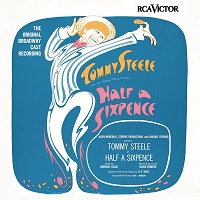 Original Broadway Cast, 1965 (RCA)
Original Broadway Cast, 1965 (RCA)  (4 / 5) Judging from the cast album, the original London production of Half a Sixpence already seemed like The Tommy Steele Show, and the cuts and additions made for Broadway took that to the next level: Steele sings in all but one song on this recording. Once again, charm ripples across David Heneker’s melodies — now with even more gorgeous orchestrations from Jim Tyler, best known for La Cage aux Folles — especially in the lilting title song and a sweet ballad, “Long Ago,” for Arthur and Ann (Polly James). While the show is overstuffed with ensemble numbers (“The Party’s On The House,” added for the Broadway production and including a weirdly American-sounding swing section, is least essential), most of them are pleasant listens, with dance arrangements and orchestrations by Robert Prince. “If the Rain’s Gonna Fall” is an especially jubilant, strolling tune that showcases Heneker’s lyric-writing aptitude, so jovial that the occasional oddball rhyme can be forgiven. “What could be wetter or damper / Than to sit on a picnic hamper / Sipping a sasparilla / Underneath the leaky umbrella?” croon Steele and the cast, and it’s totally delightful. Equally rewarding are the instrumental gems scattered throughout the album — for example, Steele’s dextrous banjo solo in “Money to Burn,” a touching flute and violin duet in the middle of “Long Ago,” and the short but sumptuous overture. — D.R.
(4 / 5) Judging from the cast album, the original London production of Half a Sixpence already seemed like The Tommy Steele Show, and the cuts and additions made for Broadway took that to the next level: Steele sings in all but one song on this recording. Once again, charm ripples across David Heneker’s melodies — now with even more gorgeous orchestrations from Jim Tyler, best known for La Cage aux Folles — especially in the lilting title song and a sweet ballad, “Long Ago,” for Arthur and Ann (Polly James). While the show is overstuffed with ensemble numbers (“The Party’s On The House,” added for the Broadway production and including a weirdly American-sounding swing section, is least essential), most of them are pleasant listens, with dance arrangements and orchestrations by Robert Prince. “If the Rain’s Gonna Fall” is an especially jubilant, strolling tune that showcases Heneker’s lyric-writing aptitude, so jovial that the occasional oddball rhyme can be forgiven. “What could be wetter or damper / Than to sit on a picnic hamper / Sipping a sasparilla / Underneath the leaky umbrella?” croon Steele and the cast, and it’s totally delightful. Equally rewarding are the instrumental gems scattered throughout the album — for example, Steele’s dextrous banjo solo in “Money to Burn,” a touching flute and violin duet in the middle of “Long Ago,” and the short but sumptuous overture. — D.R.
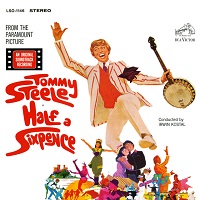 Film Soundtrack, 1968 (RCA; no CD) No stars, not recommended. All the joys of this score and in Tommy Steele’s performance can be found on the original Broadway cast recording, so there’s no need to brave the bloated soundtrack of the 1967 film adaptation in which Steele resurrected his banjo-toting Arthur Kipps. Here, every production number is extended towards eternity — “Money to Burn,” “If the Rain’s Got to Fall,” and “Flash, Bang, Wallop!” are now each seven minutes long — and whatever cinematographic choices merited such garish supersizing are obviously absent from the listening experience. Meanwhile, several songs have been cut and replaced, but of the new material, only Steele’s jaunty “Lady Botting’s Boating Regatta Cup Racing Song,” co-written by the legendary orchestrator Irwin Kostal, is worth checking out. Otherwise, Kostal’s jangly arrangements — far from his finest work — feature extensive circus and martial sounds, marching bands, and a tacky a cappella choral opening. Marti Webb, the original Ann in London, dubs Julia Foster’s singing in that role, but her soundtrack performance lacks grit: “I Know What I Am,” for instance, is plaintive and whimpery instead of boldly assertive. As for co-star Cyril Ritchard, a hammy upside of the film, his voice is basically unidentifiable on this album. Even Steele’s banjo solos here sound more interminable than impressive. — D.R.
Film Soundtrack, 1968 (RCA; no CD) No stars, not recommended. All the joys of this score and in Tommy Steele’s performance can be found on the original Broadway cast recording, so there’s no need to brave the bloated soundtrack of the 1967 film adaptation in which Steele resurrected his banjo-toting Arthur Kipps. Here, every production number is extended towards eternity — “Money to Burn,” “If the Rain’s Got to Fall,” and “Flash, Bang, Wallop!” are now each seven minutes long — and whatever cinematographic choices merited such garish supersizing are obviously absent from the listening experience. Meanwhile, several songs have been cut and replaced, but of the new material, only Steele’s jaunty “Lady Botting’s Boating Regatta Cup Racing Song,” co-written by the legendary orchestrator Irwin Kostal, is worth checking out. Otherwise, Kostal’s jangly arrangements — far from his finest work — feature extensive circus and martial sounds, marching bands, and a tacky a cappella choral opening. Marti Webb, the original Ann in London, dubs Julia Foster’s singing in that role, but her soundtrack performance lacks grit: “I Know What I Am,” for instance, is plaintive and whimpery instead of boldly assertive. As for co-star Cyril Ritchard, a hammy upside of the film, his voice is basically unidentifiable on this album. Even Steele’s banjo solos here sound more interminable than impressive. — D.R.
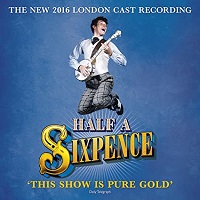 London Cast, 2016 (Exallshow Ltd)
London Cast, 2016 (Exallshow Ltd)  (1 / 5) Captured as a live recording, the aggressive revisal of Half a Sixpence that opened in 2016 at the Chichester Festival in England and later transferred to London’s West End largely drained the score of its sweet wittiness. As George Stiles and Anthony Drew had done with the stage adaptation of Mary Poppins a few years earlier, the team here again added numerous songs of their own to a pre-existing score while revising many of the originals. (There was also a brand-new book, by Downton Abbey’s Julian Fellowes.) Unfortunately, the new songs sound quite a bit like the ones that Stiles and Drew came up with for Poppins (the first two new numbers, “Look Alive” and “Believe In Yourself,” are almost rip-offs of “Cherry Tree Lane” and “Anything Can Happen”) but not at all like the work of David Heneker. And the eight and a half songs that do survive from the 1960s (“I Know Who I Am” is sadly truncated) are largely stripped of their warmth; William David Brohn’s orchestrations radiate slick bombast but seldom the tender charm of the originals. Charlie Stemp had a giddily agile presence and exuded a mix of puppy-dog innocence and deer-in-the-headlights bewilderment as Arthur Kipps on stage, but on record, he lacks the dynamic energy — not to mention the banjo skills — of Tommy Steele. Because this is a live album compiled from multiple performances during the show’s Chichester Festival Theatre run, before the West End transfer, each number is followed by lengthy applause that detracts from the listening experience, as does audience laughter at staging we can’t see. — D.R.
(1 / 5) Captured as a live recording, the aggressive revisal of Half a Sixpence that opened in 2016 at the Chichester Festival in England and later transferred to London’s West End largely drained the score of its sweet wittiness. As George Stiles and Anthony Drew had done with the stage adaptation of Mary Poppins a few years earlier, the team here again added numerous songs of their own to a pre-existing score while revising many of the originals. (There was also a brand-new book, by Downton Abbey’s Julian Fellowes.) Unfortunately, the new songs sound quite a bit like the ones that Stiles and Drew came up with for Poppins (the first two new numbers, “Look Alive” and “Believe In Yourself,” are almost rip-offs of “Cherry Tree Lane” and “Anything Can Happen”) but not at all like the work of David Heneker. And the eight and a half songs that do survive from the 1960s (“I Know Who I Am” is sadly truncated) are largely stripped of their warmth; William David Brohn’s orchestrations radiate slick bombast but seldom the tender charm of the originals. Charlie Stemp had a giddily agile presence and exuded a mix of puppy-dog innocence and deer-in-the-headlights bewilderment as Arthur Kipps on stage, but on record, he lacks the dynamic energy — not to mention the banjo skills — of Tommy Steele. Because this is a live album compiled from multiple performances during the show’s Chichester Festival Theatre run, before the West End transfer, each number is followed by lengthy applause that detracts from the listening experience, as does audience laughter at staging we can’t see. — D.R.
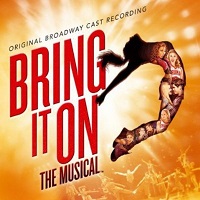 Original Broadway Cast, 2012 (Backlot Music)
Original Broadway Cast, 2012 (Backlot Music)  (3 / 5) If you love Lin-Manuel Miranda’s score for In the Heights, you’ll find lots of pleasures in Bring It On. This musical adaptation of a 2000 film about cheerleaders is copiously sprinkled with Miranda emeralds. About two thirds of the songs are by Tom Kitt and Amanda Green, writing in a lively, poppish vein that sounds familiar within the high school musical genre (though buoyantly orchestrated by Kitt and Alex Lacamoire), but the remaining numbers by Miranda ignite on a different level. Though too many of his songs here may build just like In The Heights‘ “96,000” — this show doesn’t celebrate his full range as a composer — they’re fun individually, and “It’s All Happening,” the Act II opener, is as explosive and ebullient as anything Miranda has written. The centerpiece of that song is a cheeky rap for Twig (Nick Womack), in a style reminiscent of In the Heights‘ Sonny, arguing for the virtues of boys joining the cheerleading team. But even though there are deeper themes like friendship across differences and finding your squad, most of the songs are really just about cheerleading, a topic that can only animate so many distinct musical numbers. If the well of inspiration eventually runs dry, that’s no fault of the electric cast, led by Taylor Louderman and Adrienne Warren as reluctant teammates-turned-besties. There is also a delightful early performance from Ariana DeBose. — Dan Rubins
(3 / 5) If you love Lin-Manuel Miranda’s score for In the Heights, you’ll find lots of pleasures in Bring It On. This musical adaptation of a 2000 film about cheerleaders is copiously sprinkled with Miranda emeralds. About two thirds of the songs are by Tom Kitt and Amanda Green, writing in a lively, poppish vein that sounds familiar within the high school musical genre (though buoyantly orchestrated by Kitt and Alex Lacamoire), but the remaining numbers by Miranda ignite on a different level. Though too many of his songs here may build just like In The Heights‘ “96,000” — this show doesn’t celebrate his full range as a composer — they’re fun individually, and “It’s All Happening,” the Act II opener, is as explosive and ebullient as anything Miranda has written. The centerpiece of that song is a cheeky rap for Twig (Nick Womack), in a style reminiscent of In the Heights‘ Sonny, arguing for the virtues of boys joining the cheerleading team. But even though there are deeper themes like friendship across differences and finding your squad, most of the songs are really just about cheerleading, a topic that can only animate so many distinct musical numbers. If the well of inspiration eventually runs dry, that’s no fault of the electric cast, led by Taylor Louderman and Adrienne Warren as reluctant teammates-turned-besties. There is also a delightful early performance from Ariana DeBose. — Dan Rubins

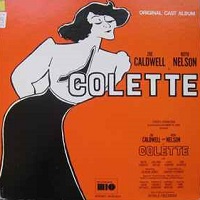
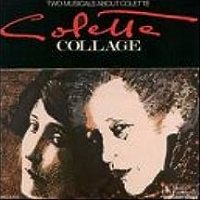
 (2 / 5) A production of the full-length musical Colette that starred Diana Rigg was intended for Broadway but closed on the road in 1982. Librettist and composer Jones and Schmidt revised the show in ’83 and again in ’91; along the way, it was retitled Colette Collage. Act I of the final version concentrates on the French novelist’s first marriage to Willy, a writer who thinks nothing of publishing work by others — including his wife — under his own name. Her books, which everyone thinks are his books, become hugely successful, and she finally leaves him. Act II covers Coletee’s later years of fame and her relationship with a younger man, Maurice. The music is lovely, amusing, and evocative, but nothing here is as beautiful as Schmidt’s best work. Colette is played by Judy Blazer in the first act, Judy Kaye in the second; both sing gloriously and are matched by George Lee Andrews as Willy, Rita Gardner as Colette’s mother, and Jason Graae as Maurice. The only piece retained from the Elinor Jones play is Schmidt’s thrilling music-hall-tour montage, cut down and fitted with lyrics by Jones. Unfortunately, it’s less effective here than as presented on the recording reviewed above. — D.W.
(2 / 5) A production of the full-length musical Colette that starred Diana Rigg was intended for Broadway but closed on the road in 1982. Librettist and composer Jones and Schmidt revised the show in ’83 and again in ’91; along the way, it was retitled Colette Collage. Act I of the final version concentrates on the French novelist’s first marriage to Willy, a writer who thinks nothing of publishing work by others — including his wife — under his own name. Her books, which everyone thinks are his books, become hugely successful, and she finally leaves him. Act II covers Coletee’s later years of fame and her relationship with a younger man, Maurice. The music is lovely, amusing, and evocative, but nothing here is as beautiful as Schmidt’s best work. Colette is played by Judy Blazer in the first act, Judy Kaye in the second; both sing gloriously and are matched by George Lee Andrews as Willy, Rita Gardner as Colette’s mother, and Jason Graae as Maurice. The only piece retained from the Elinor Jones play is Schmidt’s thrilling music-hall-tour montage, cut down and fitted with lyrics by Jones. Unfortunately, it’s less effective here than as presented on the recording reviewed above. — D.W.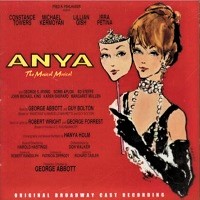
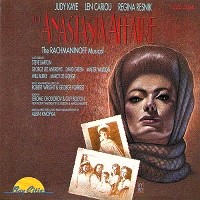
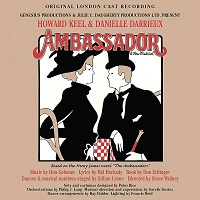
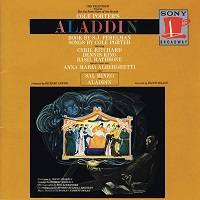
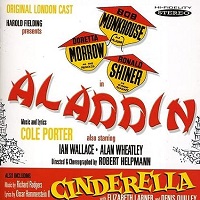
 (1 / 5) Cole Porter’s Aladdin was never adapted for presentation on Broadway, but the London stage production — tarted up as a Christmas pantomime — yielded this unfortunate recording. It includes a few songs interpolated from other Porter shows, none of which fit the spirit and tone of the original; they’re too jazzy and out-of period. Doretta Morrow displays a wonderful voice on the recording, but it sounds, shall we say, too mature for the character of the princess. (She does offer a first-class rendition of “I Am Loved,” interpolated from Out of This World.) Cyril Ritchard is sorely missed on this recording, as is the maturity and authority of Dennis King. And whereas the original TV production had great orchestrations by Robert Russell Bennett, this one features more “mod” arrangements that haven’t withstood the test of time. — K.B.
(1 / 5) Cole Porter’s Aladdin was never adapted for presentation on Broadway, but the London stage production — tarted up as a Christmas pantomime — yielded this unfortunate recording. It includes a few songs interpolated from other Porter shows, none of which fit the spirit and tone of the original; they’re too jazzy and out-of period. Doretta Morrow displays a wonderful voice on the recording, but it sounds, shall we say, too mature for the character of the princess. (She does offer a first-class rendition of “I Am Loved,” interpolated from Out of This World.) Cyril Ritchard is sorely missed on this recording, as is the maturity and authority of Dennis King. And whereas the original TV production had great orchestrations by Robert Russell Bennett, this one features more “mod” arrangements that haven’t withstood the test of time. — K.B.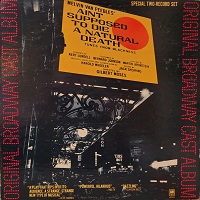
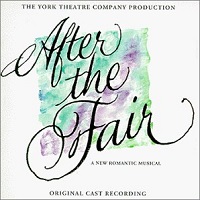
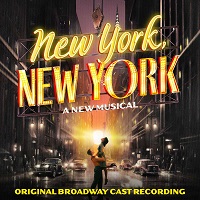
 (0.5 / 5) New York, New York is destined to go down in musical theater history books for its creative team, which includes the legendary composer John Kander as well as director/choreographer Susan Stroman and lyricist Lin Manuel Miranda, who spearheaded the two most Tony-nominated musicals of all time. Unfortunately, the show itself will be remembered as a colossal disappointment: Rather than a love letter to the city that doesn’t sleep, or even to the post-WW II era in which the action takes place, what we have here is a misguided mishmash of weaker items from the Kander & Ebb repertoire forced into a stage musical with the number of main and featured characters greatly expanded from the film on which it is very loosely based. The plot largely concerns the troubled romance between struggling musician Jimmy Doyle and struggling singer Francine Evans, but the creators seem to have determined that these characters weren’t interesting enough for an entire show. As a result, also on hand to clutter up the proceedings are an Hispanic immigrant and his abusive father and loving mother, a cleaning woman turned opera singer, a Jewish immigrant and his violin teacher, et al. “A Quell ‘Amor,” performed by the newly minted opera singer, is perhaps the nadir of the show; it makes no sense in or out of context, we never hear from its singer again, and the song’s title is 50% of its lyrics. Indeed, lyrics are not the primary concern of this production, as shown by the inclusion of six extended instrumental pieces titled “Morning in New York,” “New York in the Rain,” “New York in the Summer,” “New York in the Snow,” “New York at Night,” and “New York Concerto.” (Orchestrators Sam Davis and Daryl Waters have done an admirable job of creating a period feel and an excitement that’s lacking in the plot.) One of the oddest aspects of the show and this album is the fact that Colton Ryan, who portrays Jimmy Doyle, sings every song as if he were being strangled, emitting some of the ugliest vowel sounds ever heard. On the other hand, Anna Uzele as Francine raises the roof with her big numbers, but her acting is not quite at the level of her vocal ability. The only two pitch-perfect performances are from Emily Skinner, as the aforementioned violin teacher, and the sadly underused Clyde Alves, as the leading man’s best friend. Four demo recording are appended to this album, and in the tracks where you can hear Fred Ebb singing his own material, you start to understand what this show could’ve been if that great lyricist had lived longer: a unique, biting, entertaining final curtain call for Kander & Ebb. Instead, listeners may end up, to quote one of the show’s stronger songs, sorry they asked. — Charles Kirsch
(0.5 / 5) New York, New York is destined to go down in musical theater history books for its creative team, which includes the legendary composer John Kander as well as director/choreographer Susan Stroman and lyricist Lin Manuel Miranda, who spearheaded the two most Tony-nominated musicals of all time. Unfortunately, the show itself will be remembered as a colossal disappointment: Rather than a love letter to the city that doesn’t sleep, or even to the post-WW II era in which the action takes place, what we have here is a misguided mishmash of weaker items from the Kander & Ebb repertoire forced into a stage musical with the number of main and featured characters greatly expanded from the film on which it is very loosely based. The plot largely concerns the troubled romance between struggling musician Jimmy Doyle and struggling singer Francine Evans, but the creators seem to have determined that these characters weren’t interesting enough for an entire show. As a result, also on hand to clutter up the proceedings are an Hispanic immigrant and his abusive father and loving mother, a cleaning woman turned opera singer, a Jewish immigrant and his violin teacher, et al. “A Quell ‘Amor,” performed by the newly minted opera singer, is perhaps the nadir of the show; it makes no sense in or out of context, we never hear from its singer again, and the song’s title is 50% of its lyrics. Indeed, lyrics are not the primary concern of this production, as shown by the inclusion of six extended instrumental pieces titled “Morning in New York,” “New York in the Rain,” “New York in the Summer,” “New York in the Snow,” “New York at Night,” and “New York Concerto.” (Orchestrators Sam Davis and Daryl Waters have done an admirable job of creating a period feel and an excitement that’s lacking in the plot.) One of the oddest aspects of the show and this album is the fact that Colton Ryan, who portrays Jimmy Doyle, sings every song as if he were being strangled, emitting some of the ugliest vowel sounds ever heard. On the other hand, Anna Uzele as Francine raises the roof with her big numbers, but her acting is not quite at the level of her vocal ability. The only two pitch-perfect performances are from Emily Skinner, as the aforementioned violin teacher, and the sadly underused Clyde Alves, as the leading man’s best friend. Four demo recording are appended to this album, and in the tracks where you can hear Fred Ebb singing his own material, you start to understand what this show could’ve been if that great lyricist had lived longer: a unique, biting, entertaining final curtain call for Kander & Ebb. Instead, listeners may end up, to quote one of the show’s stronger songs, sorry they asked. — Charles Kirsch
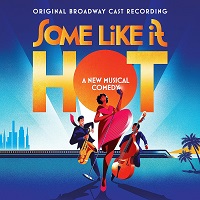
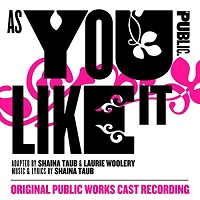
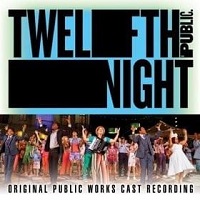
 (4 / 5) The first (and better) of Shaina Taub’s pair of Shakespeare-inspired scores for the Public Theater’s Public Works program, Twelfth Night marvelously marries Taub’s distinctive blues-inflected funk pop vocabulary with Mike Brun’s New Orleans brass arrangements. Taub turns Shakespeare into an ideal collaborator; spoken excerpts of the play’s text weave seamlessly in and out of the songs, and Taub finds the germ of each song in Shakespeare’s language. A well-constructed opening number, “Play On,” musically stresses the story’s love triangle. Nikki M. James (Viola), Nanya-Akuki Goodrich (Olivia), and Ato Blankson-Wood (Orsino) all sing terrifically, and Taub frequently throws her characters into sinewy, climactic counterpoints that capture the play’s tangled romantic webs. The comic material for Sir Toby Belch (Shuler Hensley) and Malvolio (Andrew Kober) is slighter stuff, but Taub adds in a few fun ensemble numbers (example: “Word on the Street”) for Illyria’s gossipy citizenry. Best of all is “Is This Not Love,” a ballad sung yearningly first by Taub herself as the clown, Feste, and then reprised powerfully by ensemble member Vivian Jett. — Dan Rubins
(4 / 5) The first (and better) of Shaina Taub’s pair of Shakespeare-inspired scores for the Public Theater’s Public Works program, Twelfth Night marvelously marries Taub’s distinctive blues-inflected funk pop vocabulary with Mike Brun’s New Orleans brass arrangements. Taub turns Shakespeare into an ideal collaborator; spoken excerpts of the play’s text weave seamlessly in and out of the songs, and Taub finds the germ of each song in Shakespeare’s language. A well-constructed opening number, “Play On,” musically stresses the story’s love triangle. Nikki M. James (Viola), Nanya-Akuki Goodrich (Olivia), and Ato Blankson-Wood (Orsino) all sing terrifically, and Taub frequently throws her characters into sinewy, climactic counterpoints that capture the play’s tangled romantic webs. The comic material for Sir Toby Belch (Shuler Hensley) and Malvolio (Andrew Kober) is slighter stuff, but Taub adds in a few fun ensemble numbers (example: “Word on the Street”) for Illyria’s gossipy citizenry. Best of all is “Is This Not Love,” a ballad sung yearningly first by Taub herself as the clown, Feste, and then reprised powerfully by ensemble member Vivian Jett. — Dan Rubins